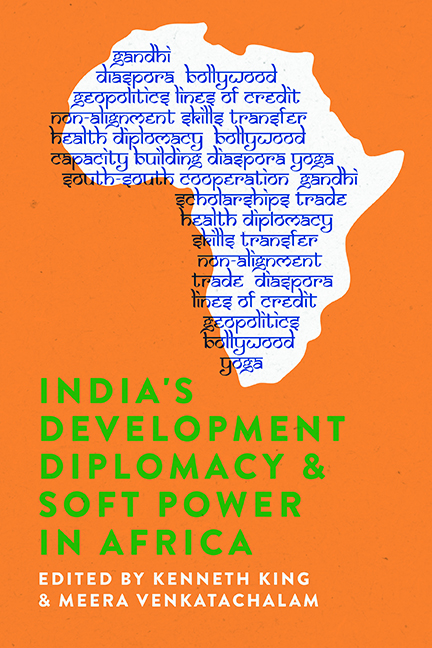Book contents
- Frontmatter
- Contents
- Notes on Contributors
- Acknowledgements
- List of Abbreviations
- Glossary
- Introduction: India–Africa Now: Changing Imaginaries and Knowledge Paradigms
- Part 1 The Geopolitical Imaginary and Soft Power
- Part 2 The Indian Political Right and the Reconfiguration of Soft Power in Africa
- Part 3 Capacity Building: Shifting Modalities and New Knowledgescapes
- Part 4 Skilling, Knowledge Transfer and Indo-African Interactions
- Conclusion: Reflections on India–Africa Studies, Development Cooperation and Soft Power
- Index
Conclusion: Reflections on India–Africa Studies, Development Cooperation and Soft Power
Published online by Cambridge University Press: 26 May 2022
- Frontmatter
- Contents
- Notes on Contributors
- Acknowledgements
- List of Abbreviations
- Glossary
- Introduction: India–Africa Now: Changing Imaginaries and Knowledge Paradigms
- Part 1 The Geopolitical Imaginary and Soft Power
- Part 2 The Indian Political Right and the Reconfiguration of Soft Power in Africa
- Part 3 Capacity Building: Shifting Modalities and New Knowledgescapes
- Part 4 Skilling, Knowledge Transfer and Indo-African Interactions
- Conclusion: Reflections on India–Africa Studies, Development Cooperation and Soft Power
- Index
Summary
On 10–12 February 2020, the India International Centre (IIC) ran a conference in Delhi on ‘Understanding Africa: Continuity and change’. Within a month, there was certainly change in both India and Africa as the Coronavirus (Covid-19) pandemic struck. Several key Indian institutions concerned with South–South knowledge transfer, such as Indian Technical and Economic Cooperation (ITEC) and the Indian Council for Cultural Relations (ICCR), found their scholarship and training programmes frozen. Suddenly, the 14,000 short-term training slots of ITEC and the 3,000 scholarship places of the ICCR were on hold. The ITEC website had a single message running continuously: ‘Currently only e-ITEC courses are being offered’ (ITEC, 2020). It would appear that the only upcoming courses were focused on ‘Good governance practices in a pandemic’ (ITEC 2020). By contrast, the ICCR saw in the pandemic the relevance of Indian philosophy: ‘Let's therefore rededicate ourselves to the task of evolving an enlightened understanding of the idea of India, and thereby make a significant contribution to India's soft power’ (ICCR 2020).
Capacity building, which is such a critical aspect of India's development cooperation, looks set to be very directly affected. Not only are its ‘flagship’ ITEC and ICCR offerings almost completely closed for the moment by travel and lockdown decisions, or have gone online, but also a majority of the other people-to-people exchanges have been stopped or have gone virtual. In the short term, the sudden absence of international students and their foreign student fees will make a massive difference to institutional sustainability in some countries. However, Indian higher education which only attracts 0.7 per cent of the global international student body may not be very severely affected by this particular dimension of student mobility. The other most conspicuous casualty of the pandemic has been the postponement of the fourth India-Africa Forum Summit (IAFS IV) which was to have taken place expect to be paused or drastically altered just two years after it started in 2018, though currently the website has not announced this (MOE 2020a).
More generally with the extent of expected damage to economic activity within India, it may well be that the activities of the Ministry of External Affairs (MEA) will be directly affected, in line with what is anticipated by other aid donors.
- Type
- Chapter
- Information
- India's Development Diplomacy and Soft Power in Africa , pp. 185 - 196Publisher: Boydell & BrewerPrint publication year: 2021



